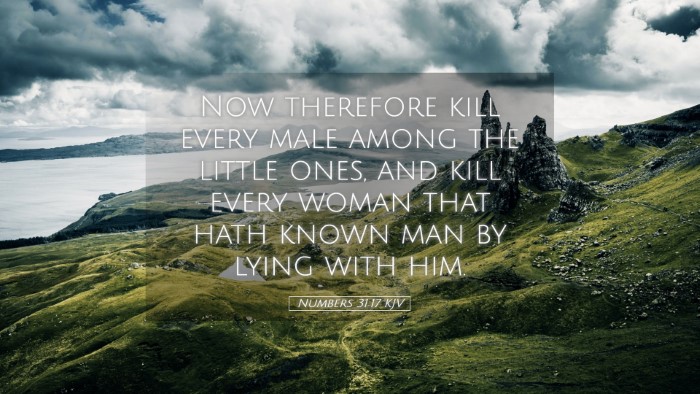Commentary on Numbers 31:17
Numbers 31:17 states, "Now therefore kill every male among the little ones, and kill every woman who has known a man intimately." This verse has often been the subject of intense scrutiny and debate. It presents a difficult and unsettling directive that requires careful examination within its historical, theological, and moral contexts.
Historical Context
The command given to the Israelites in this chapter comes after their victory over the Midianites. Numbers 31 recounts a specific campaign where the Israelites are instructed to take vengeance on the Midianites for leading Israel into sin through the events of Baal Peor (Numbers 25). Understanding this moment in Israel's history is critical; it reflects God's judgment against sin, where He employed the Israelites as His instruments of justice.
Theological Insights
From a theological perspective, this command reveals several key insights:
-
Judgment Against Sin: The annihilation of the Midianites' males and sexually active females was a severe action taken in response to the profound moral corruption that had infiltrated Israel through Midianite influence. God’s holiness demanded a strict separation from sin, establishing a precedent for punishing idolatry and moral decay.
-
Divine Sovereignty: The sovereignty of God is underscored in this passage. He is depicted as having authority over nations and peoples, directing the course of history in accordance with His divine will and purpose, even when it employs means that challenge human understanding of justice and mercy.
-
Foreshadowing Redemption: This brutal conclusion to the Midianite conflict also serves as a foreshadowing of God’s ultimate plan for redemption, a recurring theme throughout scripture. Through judgment, God preserves a remnant, ultimately leading to the coming of Christ, who fulfills the law and represents mercy in judgment.
Moral and Ethical Considerations
The ethical implications of Numbers 31:17 are deeply troubling and warrant cautious examination in light of the entirety of Scripture. While the harshness of the command raises questions of divine morality, it is essential to interpret this within the context of the ancient Near Eastern milieu where warfare, including total war, was not uncommon.
-
Context of Warfare: In ancient societies, the total destruction of enemy populations was often seen as a method of cleansing and purifying a community from potential threats. This command does not condone violence universally but reveals specific cultural norms of the time.
-
God’s Holiness: The command illustrates the seriousness with which God views sin. It compels modern readers to reconsider the nature of sin and its ramifications. Although such directives are not typically applicable in the New Testament context, they invite reflection upon God's holiness and the lengths to which He will go to maintain righteousness.
-
New Testament Perspective: The New Testament reveals a profound shift in understanding violence, judgment, and mercy. The teachings of Jesus promote love, reconciliation, and forgiveness, suggesting that this text should not be understood as prescriptive for modern believers but rather as descriptive of specific historical actions in a unique covenantal context.
Scholarly Interpretations
Various biblical scholars and commentators have elucidated on this passage, each providing perspectives that contribute to our understanding:
-
Matthew Henry: Henry emphasizes the severity of sin and the fate that befalls those who lead others astray. He explains that while this command appears harsh, it serves as a divine judgment during a critical time in Israel's formation. The context of divine command carries the weight of God's justice in a fallen world.
-
Albert Barnes: Barnes draws attention to the implications of the destruction as a means of divine retribution against idolatry. He argues that the destruction of the Midianite males and women, who had engaged in immoral practices, was necessary for protecting the Israelite community from further corruption and sin.
-
Adam Clarke: Clarke provides a detailed exegesis, suggesting that the cultural and historical frameworks should be considered. He posits that the primary focus should be on obedience to God's commands rather than a cursory examination of the consequences of those commands. His interpretation encourages readers to contemplate God’s ultimate authority and judgment.
Conclusion
In conclusion, Numbers 31:17 is a challenging verse that speaks to profound truths about divine justice, the seriousness of sin, and the call to holiness. While the actions prescribed may be difficult to comprehend through a contemporary lens, their implications underlie essential theological and moral principles. For pastors, students, theologians, and Bible scholars, the call remains to approach difficult texts with a commitment to understanding the broader narrative of redemption, the nature of God, and the ultimate hope found in Christ. Through careful study and reflection on these verses, one can draw meaningful applications for today’s context while recognizing the historical significance of God’s commands.


